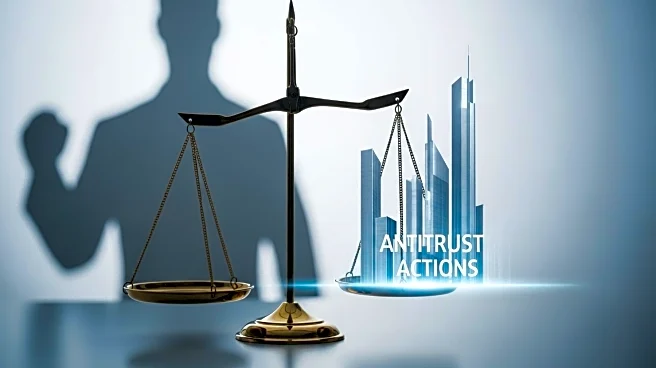What's Happening?
Business groups have called on President Trump to strengthen his antitrust crackdown against major companies like Google and Ticketmaster. In a letter, they praised Trump's appointment of aggressive antitrust leaders and urged him to pursue pending cases rather than settle. The Justice Department, led by antitrust chief Gail Slater, has lawsuits against several tech and business giants. The letter reflects tensions within Trump's administration, with some advocating for strong enforcement and others favoring a more business-friendly approach. Recent events, including a dinner with tech CEOs, have raised concerns about potential leniency.
Why It's Important?
The call for intensified antitrust enforcement highlights the ongoing debate over market power and competition in the U.S. economy. Strong action against monopolistic practices could lead to more competitive markets, benefiting consumers and smaller businesses. However, it also poses challenges for large corporations, potentially affecting their operations and profitability. The issue is politically significant, as it reflects broader concerns about corporate influence and economic inequality. Trump's response could shape his administration's legacy on antitrust policy and influence future regulatory approaches.
What's Next?
Attorney General Pam Bondi is expected to address antitrust enforcement during a Senate Judiciary Committee hearing. The administration's approach to pending cases, including those against Google and Ticketmaster, will be closely watched. The outcome could impact the tech industry and other sectors facing antitrust scrutiny. Trump's decisions may also influence legislative efforts to update antitrust laws, addressing modern challenges posed by digital platforms and large corporations.
Beyond the Headlines
The situation underscores the complexity of antitrust enforcement in the digital age, where market power can be entrenched through technology and data. It raises ethical questions about the balance between government intervention and free market principles. The debate reflects broader societal concerns about corporate influence and the need for fair competition. The administration's actions could have long-term implications for the structure of the U.S. economy and the role of government in regulating business practices.








